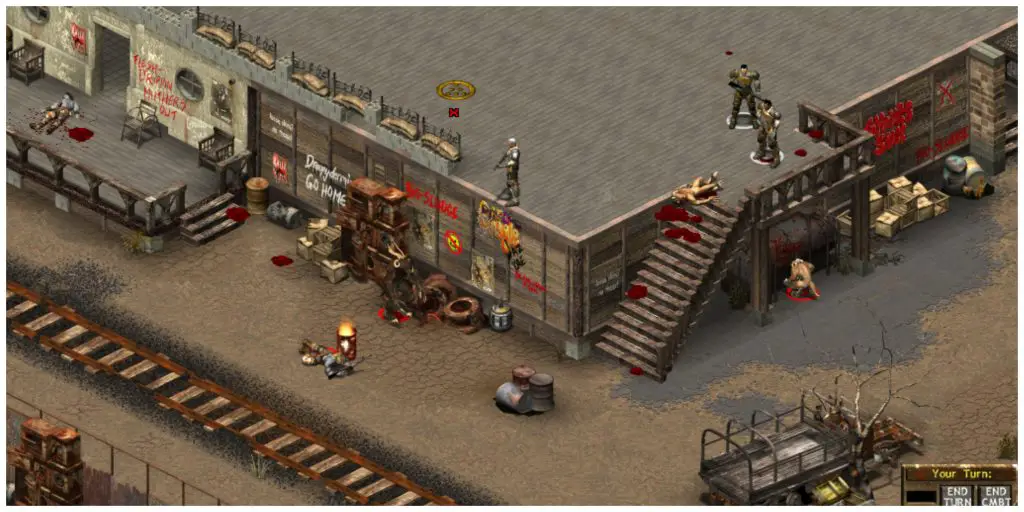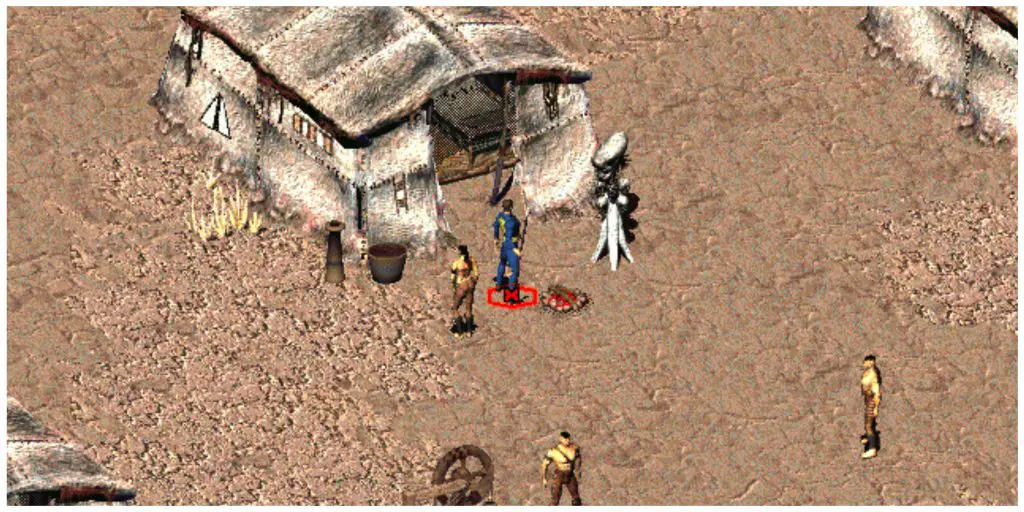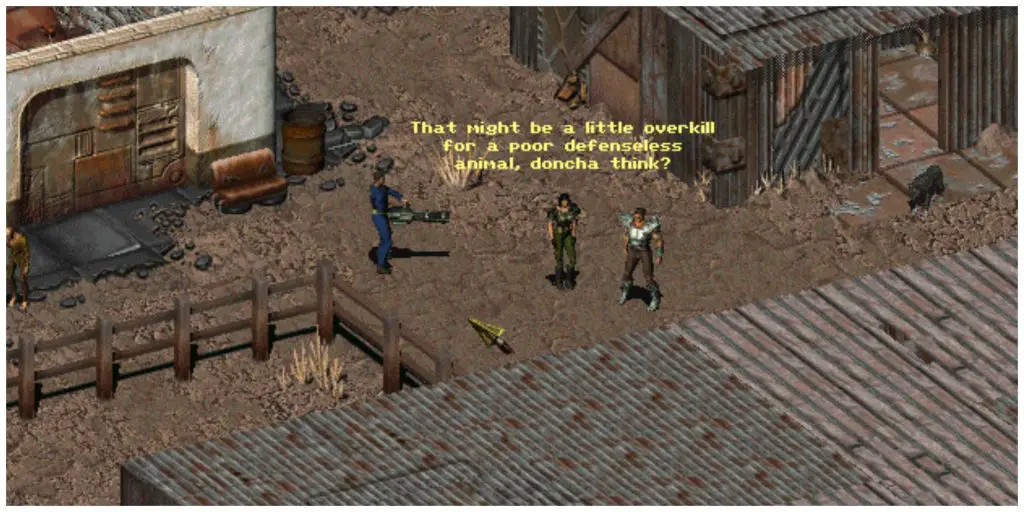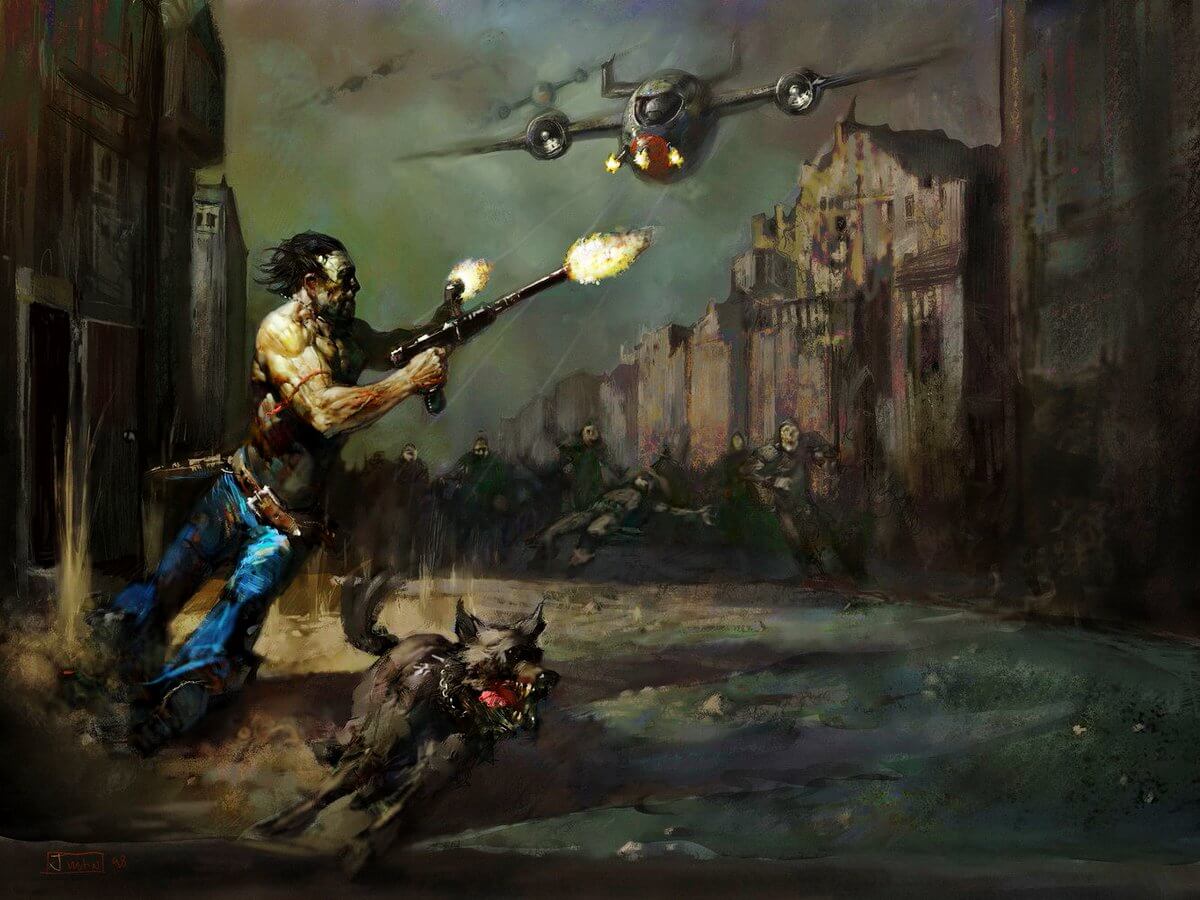The Fallout franchise is one of the biggest names in games nowadays, thanks to the open-world, first-person RPG titles, Fallout 3 and Fallout: New Vegas. However, before Bethesda and Obsidian got their hands on the iconic series, Fallout looked and felt a whole lot different.
For those who don’t know, Fallout was originally a series of turn-based RPGs. Tim Cain and Leonard Boyarsky, among others, developed the original Fallout. These two would go on to form Troika Games, the team that would develop Arcanum, The Temple Of Elemental Evil, and Vampire: The Masquerade Bloodlines.
Many Fallout fans are split between the original and its turbulent sequel, but it could be argued that each has its merits. For those who have yet to play the original Fallout games, here are some reasons why—and why not—they’re worth your time.
Fallout Tactics: Brotherhood of Steel (2001)

This often-overlooked entry in the Fallout franchise is a squad-based diversion that pulls players into the iconic Brotherhood of Steel. Fallout Tactics: Brotherhood of Steel features unique turn-based combat that allows for both simultaneous and individual turns, depending on player preference. The narrative of the game, while relatively strong, is not quite as well-crafted as the first two games. Furthermore, Bethesda, the developers and publishers of the latter Fallout games, doesn’t consider the game’s lore and narrative canon.
Getting to control a squad and play through a narrative helmed by [arguably] one of the most interesting factions in the Fallout universe – the Brotherhood of Steel – is what makes Fallout Tactics such an intriguing entry in the Fallout series. While it certainly has its quirks, Fallout Tactics is perfect for Fallout fans who are looking for a more combat-oriented game.
Fallout Tactics also featured multiplayer features, which featured a unique gameplay structure in which players were granted points to spend on building a squad. The multiplayer featured multiple game modes and several bespoke multiplayer maps. Unfortunately, these multiplayer features are mostly redundant in the modern day.
Overall, although Fallout Tactics may not be canon in Bethesda’s minds, and its options for fully turn-based gameplay can be a little frustrating to play with, the squad-based format and unique narrative spin make it a worthwhile trip for fans of the Fallout universe.
Fallout 2 (1998)

Unfortunately for fans of the original Fallout, while competent, this sequel is where Tim Cain and Leonard Boyarsky left Interplay. This was arguably detrimental to the quality of Fallout 2, as Cain and Boyarsky were key members of the original game’s design and atmosphere. 1997’s Fallout was a surprise hit for Interplay since the original game was a relatively low-budget affair. However, the production of Fallout 2 had already begun before the first game had been released, which would ultimately lead to the departure of those important developers.
Tim Cain had a strong vision for Fallout but had no interest in a sequel. When the development of Fallout 2 started to drift from Cain’s initial direction, and working at Interplay was becoming increasingly difficult, he left the project along with Jason D. Anderson and Leonard Boyarsky. After the early departure of the original Fallout’s creative leads, the remaining developers of Fallout 2 faced a massive time crunch (another reason for Cain’s resignation). This arguably led to a game that felt more rushed than the first, though many fans of this sequel prefer it to the original game.
Although Fallout 2 attempts to expand on what 1997’s Fallout had already set up, it could be argued that it sorely misses the cynicism and quick-witted humor that Cain and Boyarsky brought to the original game. As a result, Fallout 2 features humor that feels more tongue-in-cheek than the first, packed with goofball jokes and pop-culture references. This leads to an experience that is less contemplative than the first.
However, Fallout 2 is arguably a more polished experience, thanks to having time in pre-production and a solid template laid out from the first game. For example, Fallout 2 didn’t feature the clunky companions from the first game. Fallout 2 also featured expanded options for role-playing that some players will likely appreciate. Overall, Fallout 2 is arguably a more accessible experience than the first game. Still, those who enjoyed the atmosphere and tone of the first may be disappointed by this sequel’s change of direction.
Fallout (1997)

In 1997, the team at Interplay released the original Fallout, a game-changer in the world of turn-based RPGs. Not only was Fallout’s unique, dark, funny, and cynical post-apocalyptic world a joy to explore but its RPG mechanics – both in and out of combat – were expertly crafted. While Fallout may be showing its age nowadays, it’s still worth playing for fans of turn-based RPGs and Fallout alike.
The original Fallout sees players take on the role of a Vault Dweller, with an in-depth character creation system that can dramatically affect how the player progresses through the game. Fallout’s narrative is equal parts cynical, dark, and comedic. However, while its narrative is certainly strong, its greatest strength is in its fleshed-out world and the side quests that have players venturing across it.
Many memorable characters in Fallout are visualized in dialogue with their at-times unsettling talking heads. Exploring the world and speaking to these characters is a large part of the fun in 1997’s Fallout, and this is arguably true for the rest of the franchise. Most importantly, though, Fallout strongly emphasizes player agency; action and consequence are a huge part of Fallout’s design, making it so replayable. It’s rare that games go to the lengths Fallout did back in 1997, making this rough-edged gem worth playing even after all these years.
Conclusion
Although Bethesda eventually changed the course of the Fallout franchise, these initial entries in the hit series are thankfully cemented in gaming history, in large part thanks to their successful Steam ports.
Fallout, Fallout 2, and Fallout Tactics, even to this day, remain worthwhile games for fans of turn-based RPGs. While they can’t compete with the complexity of modern games such as Baldur’s Gate 3, mostly due to a difference in technology, time, and budget, these RPGs consistently offer dynamic experiences with a focus on player agency that is rare in the modern era.







